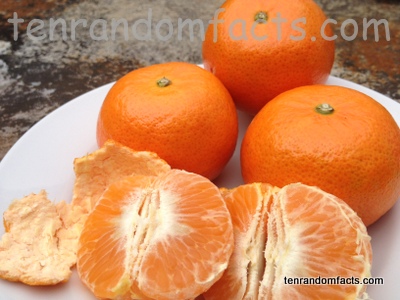Orange, juicy mandarins.
- Mandarins are small, orange coloured, citrus fruits that usually grow on a small to medium sized trees and are similar to an orange, but are often sweeter.
- Mandarins, also known as ‘mandarines’, are said to be named after the Chinese officials of the same name who wore orange robes, and are often used in celebrating Christmas in United States and Canada and are a symbol of Chinese New Year.
- Mandarins are native to south east Asia, and the scientific name is Citrus reticulata, belonging to the Rutaceae family, the family of citrus fruit.
- Mandarins are peeled easily by hand and the segments inside can be pulled apart easily without making a mess.
- China is by far the major producer of mandarins, producing just over half of the world total’s mandarin production of 24.6 million tonnes (27.1 million tons) in 2011.
- Mandarins are a good source of dietary fibre and vitamin A, and are an excellent source of Vitamin C, with one mandarin providing up to 80% of your daily needs, as well as being high in antioxidants, and helping to prevent heart disease and cancer.
- Mandarins are most commonly eaten raw but can be eaten in salads, main dishes and desserts and can even be canned.
- Mandarin peel has valuable essential oil that is used as a commercial flavouring ingredient in liqueurs, soft drinks, confectionery, ice cream and baked goods.
- Some mandarin varieties have many seeds, while others only have a few, and there are some cultivars that are seedless.
- Mandarins have a fairly short shelf life, and start to deteriorate after 2 to 4 weeks in storage.





